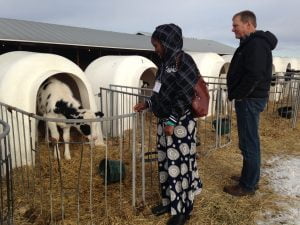Talking with Farmers
 Group photo at the Sylvan Star cheese factory – Public engagement members, Foodgrains Bank staff and Kenyan partners.
Group photo at the Sylvan Star cheese factory – Public engagement members, Foodgrains Bank staff and Kenyan partners.December 2, 2015
By Suzanne Rumsey
Canadian Foodgrains Bank Public Engagement Members “Go Rural”
“Farming is what we do. This we feel right from the heart.”
It turns out that when you ask a room full of farmers why they participate in Growing Projects for the Canadian Foodgrains Bank, you get an ‘obvious answer to a silly question’ response. Farming is what they do and “just like farming” they “make money or lose money” as they personally invest their time, land, equipment and inputs into growing about $7 million worth of crops for the Foodgrains Bank annually.
The scene of this exchange was an annual meeting of Alberta farmers involved in Growing Projects to which the members of the Foodgrains Bank’s Public Engagement Working Group were invited to listen in and ask questions of. For those of us involved in public engagement work in one or another of the 15 member agencies and churches of the Foodgrains Bank, that meeting, and a day spent learning about Alberta agriculture at an artisanal cheese factory, on a dairy farm, and in conversation with farmers as we criss-crossed the Alberta countryside, provided rich learning opportunities and much ‘food’ for thought.
I participated in this event representing PWRDF which, on behalf of the Anglican Church of Canada, has been a member of the Foodgrains Bank since 2007. In a recent Bank survey it was learned that there are an estimated 34 Anglican churches/parishes across the country involved in some way in Growing Projects.

The challenges facing Canadian farmers are many and complex. Over a meal at the cheese factory, Ron, a cattle rancher and Byron, a grain farmer, gave us a glimpse of those challenges. Byron runs a 5,400 acre grain farm. He hopes his young grandson will become the seventh generation working the family’s land. He is adamant that chemical inputs and GM (genetically modified) seeds are essential to making his farm viable. But he is also passionate about the price he pays for staying viable: “I hate that I’ve lost control of my seed supply [to Monsanto]. I rent my seed. I’m a Christian, how do I live with this reality? I would lose 30-50% of production if I wasn’t part of the system.” Ron added that, “Our Christian responsibility to be socially responsible and care for our animals, sometimes means using painkillers and antibiotics.”
When we gathered the next day for our Public Engagement Working Group meeting, we discussed how, as educators in our member denominations, it is challenging to hold the reality of farmers like Byron and Ron, as well as those in our members denominations who want to support organic production and consumption as well as organic Growing Projects. Connecting urban food consumers (like us) with rural food growers is a good place to start.
Together with the farmers met at the annual meeting, Byron agreed that the Foodgrains Bank represents an important Canadian ecumenical initiative: “I love that it’s 15 churches and church agencies generously doing this work together.”
And we couldn’t do it without the farmers.
For media requests please contact Communications Coordinator Janice Biehn at (416) 924-9199;366.
